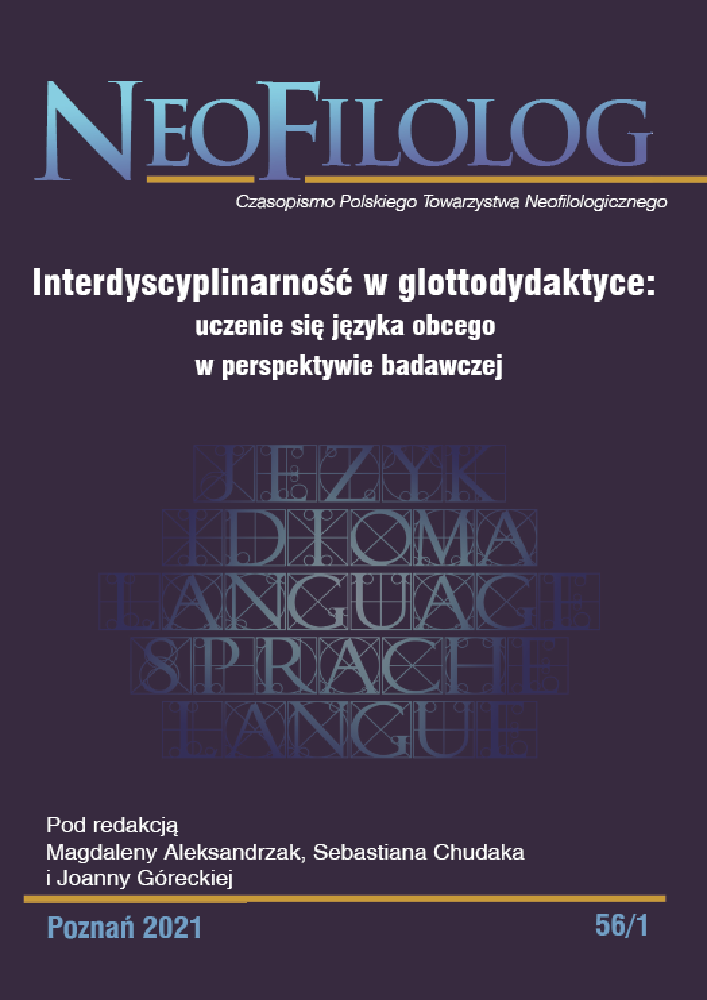Abstract
The article discusses a case study focusing on the students’ task of analyzing expressing opinions in Polish and English TV discussions. The written observation task is performed as a final requirement to receive credit for the course of interaction analysis, during which the second-year students of applied linguistics are introduced to the basic methods of conversation analysis. I use document analysis of students’ discourse to distinguish the main tendencies in performing the task by the students.
The aim of the research presented in the paper is assessing the students’ ability to use conversation analysis in observing different ways of expressing opinion in selected Polish and American TV discussions. I especially focus on evaluating the students’ skill of unmotivated looking at the ways of expressing opinions in TV discussions. This phenomenological observation requires suspending the researcher’s personal views and assumptions concerning the meaning of actions in interaction. The main aim of conversation analysis is discovering the meaning of communicative actions from the perspective of a talk participant. If applied appropriately, this kind of observation allows student-researchers to avoid a tendency to rely on stereotypical evaluations in the analysis of interactions.
Literaturhinweise
Barraja-Rohan A. M. (2011), Using conversation analysis in the second lan-guage classroom to teach interactional competence. „Language Teach-ing Research”, nr 15 (4), s. 479-507.
Bowen G. A. (2009), Document Analysis as a Qualitative Research Method, „Qualitative Research Journal” nr 9 (2), s. 27-40.
Boyle R. (2000), Whatever happened to preference organization. „Journal of Pragmatics”, nr 32, s. 583-604.
Doehler S. P., Wagner J., González Martinez E. (2018), Longitudinal studies on the organization of social interaction. Basingstoke, Hampshire: Palgrave Macmil-lan.
Górecka J., Wojciechowska B. (2013), Rozwijanie rozumienia publicystycz-nych audycji radiowych: specyfika etapu poprzedzającego słuchanie. „Neofilolog”, nr 40 (1), s. 59-77.
Heritage J. (1984), Garfinkel and Ethnomethodology. Hoboken: Wiley.
Hutchby I., Wooffitt R. (1998), Conversation analysis: Principles, practices, and applications. Cambridge: Polity Press.
Kasper G., Rose K. R. (2002), Pragmatic development in a second language. Language learning monograph series. Oxford: Blackwell.
Kasper G., Wagner J. (2018), Epistemological Reorientations and L2 Interac-tional Settings: A Postscript to the Special Issue. „The Modern Lan-guage Journal”, nr 102, s. 82-90.
Markee N. (2000), Conversation analysis. Second language acquisition re-search: theoretical and methodological issues. Mahwah, N.J., London: L. Erlbaum Associates.
Pomerantz A. (1984), Agreeing and disagreeing with assessments: Some features of preferred/dispreferred turn shapes, (w:) Atkinson J. M., Heritage J. (red.), Studies in emotion and social interaction. Structures of social action: Studies in conversation analysis. Cambridge: Cambridge University Press, s. 57-110.
Rapley T. (2007), Doing conversation, discourse and document analysis. Los Angeles, London, New Delhi, Singapore, Washington, DC, Melbourne: SAGE.
Seedhouse, P. (2004), The interactional architecture of the language classroom: A conversation analysis perspective. Malden, Mass., Oxford: Blackwell.
Sidnell J. (2014), The architecture of intersubjectivity revisited, (w:) Enfield N., Kockelman P., Sidnell J. (red.), The Cambridge Handbook of Linguistic Anthropology. Cambridge: Cambridge University Press.
Tannen D. (1998), The argument culture: Changing the way we argue and debate. London: Virago.
Vaismoradi M., Turunen H., Bondas T. (2013), Content analysis and thematic analysis: Implications for conducting a qualitative descriptive study, „Nursing & health sciences”, nr 15 (3), s. 398-405.
Wagner J., Pekarek-Doehler S. (2006), Progressive bricolage of TCUs in second language talk. ICCA international conference on conversation analysis, Hel-sinki.
Wierzbicka A. (2003), Cross-Cultural Pragmatics: The Semantics of Human Interaction. Mouton Textbook. Berlin, New York: Mouton de Gruyter.
NETOGRAFIA
https://www.hoover.org/research/unconventional-wisdom-torture-and-war-terror [DW 31.01.2020]
Lizenz
Copyright (c) 2021 Agnieszka Nowicka

Dieses Werk steht unter der Lizenz Creative Commons Namensnennung - Keine Bearbeitungen 4.0 International.
Autoren:
Die Autoren der zur Veröffentlichung in der Zeitschrift Neofilolog angenommenen Texte sind verpflichtet, den Vertrag über die Erteilung einer kostenlosen Lizenz für die Werke mit der Verpflichtung zur Erteilung einer Sublizenz CC auszufüllen, zu unterzeichnen und an die Adresse der Redaktion zurückzusenden.
Gemäß Vertrag erteilen die Autoren auf die in der Zeitschrift Neofilolog veröffentlichten Texte der Adam-Mickiewicz-Universität in Poznań eine nicht exklusive und kostenlose Lizenz und erlauben die Verwendung der Sublizenz Creative Commons Attribution-NoDerivatives 4.0 International (CC BY-ND 4.0).
Die Autoren behalten das Recht zur weiteren freien Verfügung über das Werk.
Benutzer:
Interessierte Onlinebenutzer dürfen die seit 2017 veröffentlichten Werke unter folgenden Bedingungen nutzen:
- Anerkennung der Urheberschaft - die Verpflichtung, zusammen mit dem verbreiteten Werk Informationen über die Urheberschaft, den Titel, die Quelle (Links zum Originalwerk, DOI) und die Lizenz selbst bereitzustellen;
- ohne Schaffung abgeleiteter Werke - das Werk muss in seiner ursprünglichen Form erhalten bleiben, ohne Zustimmung des Autors dürfen keine Studien, beispielsweise Übersetzungen, verbreitet werden.
Die Urheberrechte aller veröffentlichen Texte sind vorbehalten.
Sonstige:
Die Adam-Mickiewicz-Universität in Poznań behält das Recht auf die Zeitschrift als Gesamtheit (Layout, Grafik, Titel, Umschlagsprojekt, Logo usw.).
